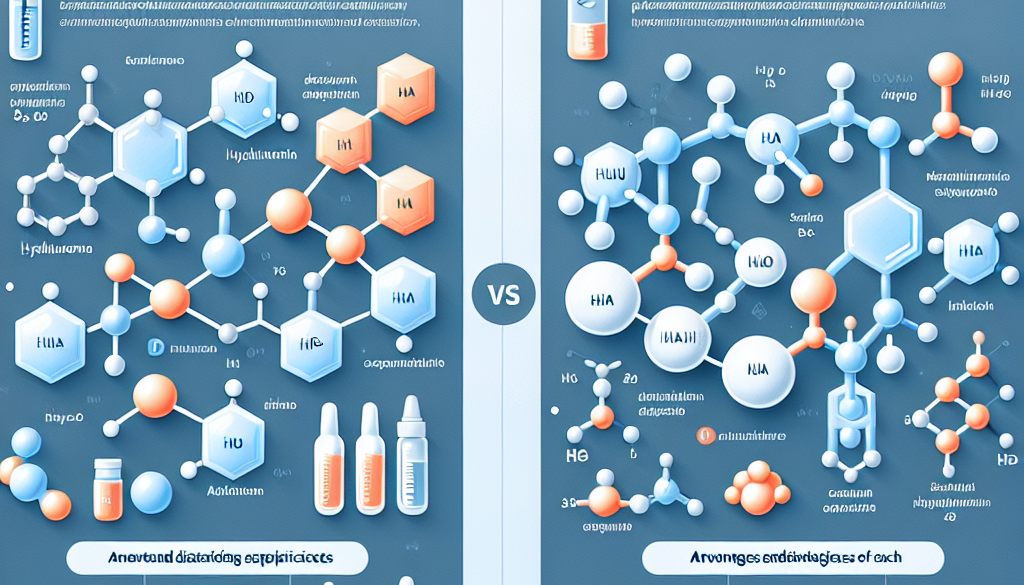Hyaluronic Acid Sodium Hyaluronate: What’s the Difference?
-
Table of Contents
- Hyaluronic Acid vs. Sodium Hyaluronate: Understanding the Differences
- Introduction to Hyaluronic Acid and Sodium Hyaluronate
- Chemical Structure and Properties
- Benefits in Skincare and Medicine
- Skincare Applications
- Medical Uses
- Comparative Analysis in Cosmetic Formulations
- Industry Usage and Consumer Choice
- Conclusion: Key Takeaways
- Explore ETprotein’s Protein Products
Hyaluronic Acid vs. Sodium Hyaluronate: Understanding the Differences
In the world of skincare and medical treatments, hyaluronic acid and sodium hyaluronate are often mentioned in the same breath. Though closely related, these two compounds are not identical and have distinct properties and uses. This article delves into the differences between hyaluronic acid and sodium hyaluronate, exploring their chemical structures, benefits, and applications in various industries.
Introduction to Hyaluronic Acid and Sodium Hyaluronate
Hyaluronic acid (HA) is a naturally occurring polysaccharide found in the human body, known for its capacity to attract and retain moisture. It plays a crucial role in maintaining skin hydration, elasticity, and tissue repair. Sodium hyaluronate, a derivative of hyaluronic acid, is the salt form of HA and has a lower molecular weight. This difference in molecular structure influences their absorption and efficacy in both topical and injectable forms.
Chemical Structure and Properties
- Hyaluronic Acid: It is a large molecule, which can be up to several million Daltons in molecular weight. This size allows it to hold up to 1,000 times its weight in water, making it highly effective in moisturizing skin.
- Sodium Hyaluronate: As the sodium salt of hyaluronic acid, it has a much lower molecular weight. This smaller size makes it more easily absorbed by the skin, providing deeper hydration and more substantial tissue penetration.
Benefits in Skincare and Medicine
Skincare Applications
Both compounds are celebrated for their hydrating properties, but their different molecular weights make them suitable for various skincare needs:
- Hyaluronic Acid: Ideal for surface hydration, forming a breathable film on the skin’s surface that helps to retain moisture and protect against environmental factors.
- Sodium Hyaluronate: Due to its smaller size, it is perfect for serums and creams that aim to penetrate deeper into the skin, enhancing skin hydration beneath the surface and improving skin texture.
Medical Uses
Both hyaluronic acid and sodium hyaluronate are used in medical contexts, particularly in joint health and ophthalmic applications:
- Hyaluronic Acid: Often used in viscosupplementation therapy for osteoarthritis. It is injected directly into the joint cavity to act as a lubricant and shock absorber.
- Sodium Hyaluronate: Commonly found in eye drops to treat dry eye syndrome due to its excellent penetration and ability to retain moisture on the ocular surface.
Comparative Analysis in Cosmetic Formulations
When it comes to cosmetic formulations, the choice between hyaluronic acid and sodium hyaluronate often depends on the desired product texture and skin absorption rate:
- Hyaluronic Acid: Provides a richer, more cushioning feel, suitable for products aimed at surface hydration.
- Sodium Hyaluronate: Offers a lighter feel and faster absorption, ideal for lightweight, non-greasy formulations.
Industry Usage and Consumer Choice
Understanding the differences between these two ingredients can help consumers make informed decisions about the skincare products they choose, depending on their hydration needs and skin type. Additionally, industries such as pharmaceuticals and nutraceuticals leverage these differences to develop targeted solutions for various health issues, including joint pain and eye health.
Conclusion: Key Takeaways
The primary distinctions between hyaluronic acid and sodium hyaluronate lie in their molecular weight and penetration abilities. Hyaluronic acid is best for surface-level moisturization and is ideal in thicker, more hydrating products. In contrast, sodium hyaluronate excels in penetrating the skin deeply, making it suitable for treatments requiring deeper hydration and more substantial biological effects.
Both compounds play vital roles in skincare and medical treatments, and understanding their differences is crucial for both consumers and professionals in the industry.
Explore ETprotein’s Protein Products
For those interested in high-quality protein products, ETprotein offers a range of organic and allergen-free options suitable for various industries. Their products, including organic rice protein and pea protein, are perfect for enhancing nutritional content and meeting dietary needs.
ETprotein is Sodium hyaluronate Factory Manufacturer and Supplier in China, Check further information by visiting the Sodium hyaluronate Product Page
Sodium hyaluronate Product Page
Request Quotation and Samples of Sodium hyaluronate from ETprotein
About ETprotein
ETprotein, a reputable protein and elite nutrition ingredients Sodium hyaluronate Chinese factory manufacturer and supplier, is renowned for producing, stocking, exporting, and delivering the highest quality organic bulk vegan proteins and elite nutritional ingredients Sodium hyaluronate. They include Organic rice protein, clear rice protein, pea protein, clear pea protein, watermelon seed protein, pumpkin seed protein, sunflower seed protein, mung bean protein, peanut protein. Their offerings, characterized by a neutral taste, non-GMO, allergen-free attributes, cater to a diverse range of industries. They serve nutraceutical, pharmaceutical, cosmeceutical, veterinary, as well as food and beverage finished product distributors, traders, and manufacturers across Europe, USA, Canada, Australia, Thailand, Japan, Korea, Brazil, and Chile, among others.
ETprotein specialization includes exporting and delivering tailor-made protein powder and finished nutritional supplements. Their extensive product range covers sectors like Food and Beverage, Sports Nutrition, Weight Management, Dietary Supplements, Health and Wellness Products, and Infant Formula, ensuring comprehensive solutions to meet all your protein needs.
As a trusted company by leading global food and beverage brands and Fortune 500 companies, ETprotein reinforces China’s reputation in the global arena. For more information or to sample their products, please contact them and email sales(at)ETprotein.com today.














